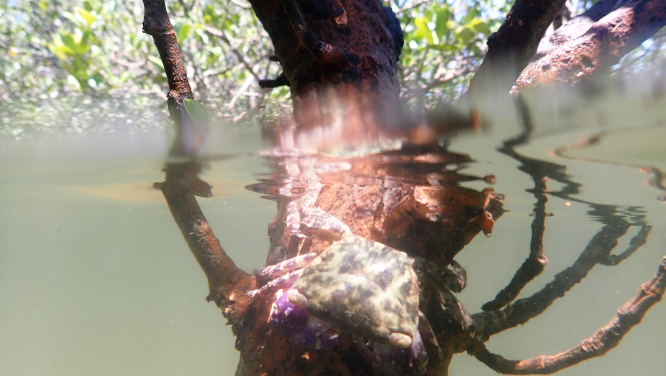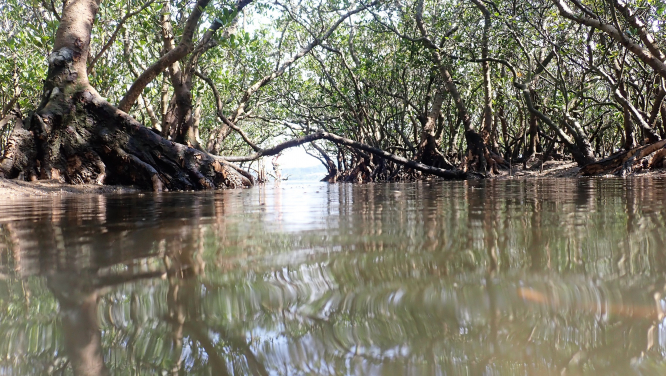Media
A team of international mangrove forest experts suggesting
optimistic cause for global mangrove conservation
25 Feb 2020
More than a decade ago, a team of mangrove experts warned that mangrove forests were being lost faster than almost any other ecosystem, including coral reefs and tropical rainforests. Nonetheless, the situations are getting better now. An international team of 22 researchers led by National University Singapore (NUS) from 24 institutes including Dr Stefano Cannicci from The Swire Institute of Marine Science and School of Biological Sciences, the University of Hong Kong (HKU), found that there is now cause for optimism, with the global loss rate of mangrove forests less alarming than previously suggested.
After studying various earlier presented works, the team found that globally, mangrove loss rates have reduced by almost an order of magnitude between the late 20th and early 21st century – from what was previously estimated at 1% to 3% per year, to about 0.3% to 0.6%. The drastic drop in the loss rate is attributed greatly to the successful mangrove conservation efforts. This heightens conservation optimism amongst broader projections of environmental decline.
A commentary summarising the team’s findings was published in the scientific journal Current Biology. This international effort was the result of the Fifth International Mangrove Macrobenthos and Management conference (MMM5), the world’s largest mangrove conference which was held for the first time in Singapore last year.
“The team deduced that the reduction in mangrove global loss rates has resulted from improved monitoring and data access, changing industrial practices, expanded management and protection, increased focus on rehabilitation, and stronger recognition of the ecosystem services provided by mangroves,” explained Associate Professor Daniel Friess from the Department of Geography of NUS.
Dr Cannicci from HKU said: “I am very proud of being one of the academics who warned about world mangrove loss a decade ago, since I think that the paper published at that time contributed to a turn the tide on mangrove degradation. There are still dangers and we still have to manage and preserve mangroves worldwide, but the perception about their importance for humankind has definitely changed. In particular, a recent survey held in Hong Kong by me showed that mangroves area in Hong Kong has increased in the last 20 years and that these ecosystems are huge reservoirs of crab, mollusca and insect diversity.”
Dr Cannicci said the data discussed in the present paper strongly support the need to implement good practices in conservations, also for Hong Kong mangroves. He remarked: “Although small and limited in size, HK mangroves harbour a magnificent diversity of plant and animal species. Eight species of trees, 53 species of crabs and 42 species of snails have been recorded in these forests, which is more than is known for the mangrove forests of the whole African continent.”
After years of degradation, mangroves in Hong Kong now cover about 350 ha (Hong Kong Island has an area of about 7859 ha). Distributed across about 40 forests, they represent the largest remaining mangrove patch within the Pearl River Delta, with the largest one distributed along the coast of Deep Bay. There are also many small, but pristine patches in the North East New territories and a small one located on Hong Kong Island.
Positive change in mangrove conservation
Mangrove forests occur along the shorelines of more than 100 countries and are incredibly important as they offer numerous critical benefits to people, including protection from coastal erosion and storm as well as cyclone damage, natural filters for pollution and sediment, carbon sequestration which helps to mitigate climate change, and provide millions of people with products such as fuelwood, construction materials and fisheries resources, since mangroves act as nursing grounds for many coastal fishes.
“There is strong evidence that positive conservation change is occurring. Mangrove conservation has gained substantial momentum, with greater public and government awareness leading to investment and on-the-ground action. However, despite recent mangrove conservation successes, tempered optimism is necessary, as conservation gains are not evenly spread, nor guaranteed into the future,” cautioned Associate Professor Friess.
Mangroves under threat in emerging deforestation frontiers
The team found that mangroves continue to be threatened by aquaculture, agriculture and urban development across the world, particularly for new deforestation frontiers that are emerging throughout parts of Southeast Asia and West Africa. Southeast Asia is a traditional hot spot of mangrove deforestation as mangroves are cut down to make space for aquaculture ponds, cleared for rice paddy cultivation, and reclaimed for industrial and port development.
“Emerging deforestation frontiers need to be addressed early. Improved environmental governance and increased public intervention can help secure positive conservation outcomes in these locations. We need to take decisive steps to improve the success and scale of mangrove rehabilitation, and increase the resilience of mangroves to sea-level rise to maintain the current progress in mangrove conservation,” commented Dr Candy Feller from the Smithsonian Environmental Research Center, one of the contributors to the study.
Maintaining current progress in mangrove conservation
Even mangrove rehabilitation is lauded as a method to offset historical as well as ongoing losses and can yield long-term ecosystem service provision, the team found that successful rehabilitation is still a challenge to achieve at scale. Current mangrove rehabilitation projects around the world can fail because key ecological thresholds and rehabilitation best practices are ignored – for instance, planting in low-intertidal locations that are not suitable for mangrove growth and using non-native species that can quickly become invasive, which gives rise to myriad ecological impacts on the intertidal zone.
“Ensuring that mangrove conservation gains are not short-lived will require continued research, policy attention, and renewed efforts to improve the success of mangrove rehabilitation at a scale that will be ecologically impactful,” said Dr Erik Yando, Research Fellow at the NUS Department of Geography.
To ensure that the mangrove conservation gains are not short-lived, continued research, policy attention, and renewed efforts to improve the success of mangrove rehabilitation at a scale are required. The international team will continue to monitor mangrove deforestation and conduct studies to assess the benefits and values of mangroves in Southeast Asia.
(The press release is adapted from the press release of NUS)
Image download: www.scifac.hku.hk/press
The article: “Mangroves give cause for conservation optimism, for now” in Current Biology
Link of the article: https://www.cell.com/current-biology/fulltext/S0960-9822(19)31687-2
For more information about Dr Stefano Cannicci’s research, please visit: https://www.imeco-lab.com/
For media enquiries, please contact Ms Cindy Chan, Assistant Communications Director of Faculty of Science (Tel: 3971 5286; email: cindycst@hku.hk) or Dr Stefano Cannicci from The Swire Institute of Marine Science and School of Biological Sciences, The University of Hong Kong(email: cannicci@hku.hk).


